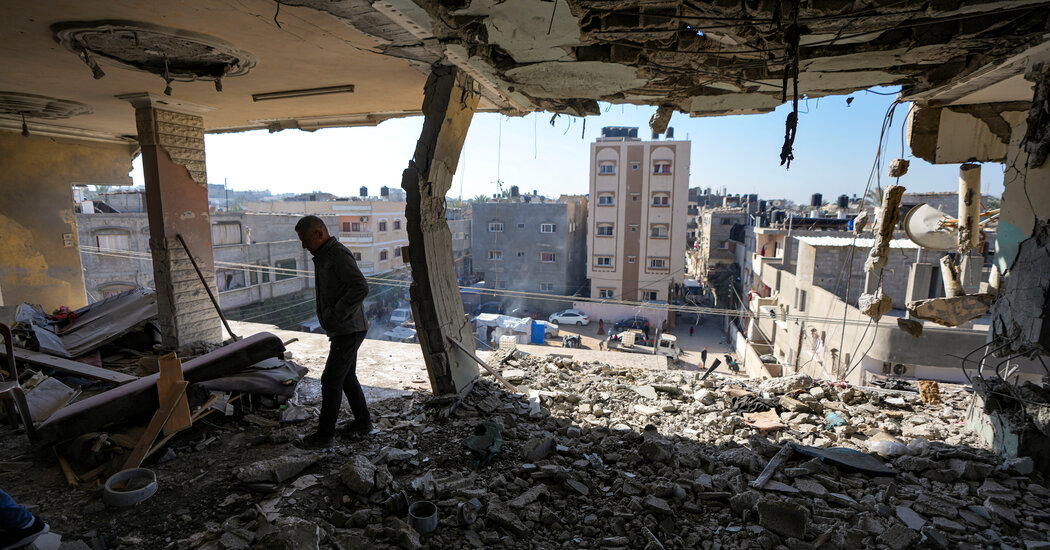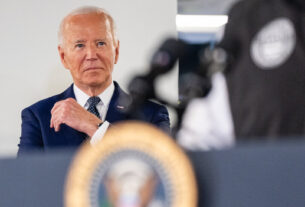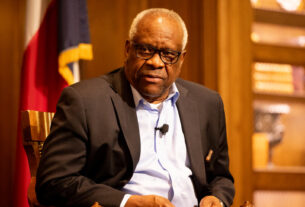For more than a year, almost two million Palestinians living in Gaza have been homeless, facing severe food and medical shortages and under enduring threat of Israeli airstrikes. Nearly 46,000 Gazans have been killed, local health officials said on Wednesday, in a landscape largely reduced to rubble.
So when President-elect Donald J. Trump vowed that “all hell will break out in the Middle East” if hostages taken from Israel during the Hamas-led attacks of Oct. 7, 2023, are not freed in the next two weeks, Gazans were left to wonder: if this is not hell, then what is?
“I am not sure he understands the situation here — it is already hell,” said Alaa Isam, 33, from Deir al Balah, in central Gaza.
Negotiations to end the war between Israel and Hamas have made little progress, leaving civilians in Gaza caught in the crossfire with little hope for the future.
“We have been being killed for 15 months,” Mr. Isam said. “We have been through two cold winters in tents, two hot summers that ruined our food. We have been subject to starvation and people died out of hunger, in addition to the continuous brutal bombardment of everywhere.”
Speaking to reporters on Tuesday, Mr. Trump said, “I don’t want to hurt the negotiation” for a hostage exchange and a cease-fire agreement that remain under discussion. Mr. Trump’s incoming top Middle East envoy, Steven Witkoff, is expected to join those talks in Doha, Qatar, later this week.
But Mr. Trump was explicit about threatening consequences should Hamas refuse to release about 100 remaining hostages — at least a third of whom are presumed dead — who were taken from Israeli territory and have been held since the militant group led the attack on Israel.
“It will not be good for Hamas and it will not be good, frankly, for anyone,” he said.
“If the deal isn’t done before I take office, which is now going to be two weeks, all hell will break out in the Middle East,” Mr. Trump added.
His comments reverberated Wednesday across Gaza, including with some civilians who understood the threat to mean that Palestinians would be punished and not Israel if an agreement on the hostages is not reached by Jan. 20, when Mr. Trump is inaugurated.
Akram al-Satri, 47, a freelance translator from Khan Younis, in southern Gaza, said he found it strange that Mr. Trump “does not realize that Gaza has been deprived of all forms of life, and that he thinks he could add to that hell while Israel had not been spared any effort in turning the lives of Gazans into something far uglier than hell.”
“All of us who witness bombs dropping over our heads daily” were living “a reality that is more destructive and miserable than hell,” he added.
While most Gazans mainly blame Israel for the death and destruction around them, many also say they hold Hamas responsible for starting the war.
“Hamas should have reached an agreement long time ago,” said Abdul Aziz Said, 33, who is also from Deir al Balah. “They say ending the war is their priority, but do not act like this is the case. I know Israel is not offering them anything serious, but I don’t care. I want this killing to stop.”
Mr. Witkoff on Tuesday struck an optimistic tone that a deal could soon be reached. “I think that we’ve had some really great progress, and I’m really hopeful that by the inaugural we’ll have some good things to announce on behalf of the president,” he said, standing next to Mr. Trump.
Regardless of the war’s outcome, several Gazans interviewed on Wednesday said they feared a continuation of the pro-Israel policies Mr. Trump pursued in his first term, from 2017 to 2021.
In those years, the American Embassy in Israel was moved from Tel Aviv to Jerusalem, which Palestinians also claim as their capital, and the United States also recognized Israel’s sovereignty over the Golan Heights, which Israel captured from Syria in 1967. Palestinians and their allies in Arab states also worry that Mr. Trump will not stop Israel from annexing more disputed areas in the West Bank and occupying at least parts of Gaza.
But many Palestinians have fumed over the past year that the United States, under President Biden, has not done more to protect them from Israeli strikes that have leveled their cities and halted humanitarian aid deliveries.
Just this past week, the Biden administration informed Congress that it would allow American weapons producers to sell $8 billion in arms to Israel, including 500-pound bombs that can cause significant injury and death, especially in areas with little protection, like tent camps. Many of the weapons would most likely be shipped over the next two years, but some could be delivered within months.
“The engine of this entire ugly and unjust offensive is America,” said Amna Soliman, 42, a former teacher at the American International School in Gaza. “There is nothing left of Gaza.”
Forced to flee her home in Jabaliya, in northern Gaza, Ms. Soliman said that at least a half-dozen of her relatives had died and that she had lost her job since the start of the war’s “hellish reality.”
“We are already living in fear and worry and horror,” she added.





